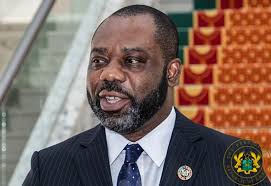The Education Minister has inaugurated eight (8) College of Education Governing Council as the government seeks to enhance and improve the education sector by ensuring quality training of teachers.
The Governing Councils are as follows: Holy Child of Education, Kibi College of education, St. Theresa’s College of education, Mt. Mary College of education, Tamale College of education, St. John Bosco College of education, Gambaga College of education and Gbewaa College of education.
Inaugurating these eight (8) Governing Council at a ceremony in Accra, the Education Minister, Dr. Matthew Opoku Prempeh acknowledged the essential role of the Governing Council stating , it is an important actor in the decision-making process and formally the most central strategic body at the institutional level.
Believing that, the governing council can be viewed as an important arena for institutional change and also responsible for quality assurance, efficiency and effectiveness.
This, according to him, the Education Minister is the reason why President Akufo-Addo chooses persons to strengthen the institution as a whole even as it carries out its mandate to drive the change agenda.
The mandate of the Council according to him is o ensure that, the Colleges of Education trains students to acquire the necessary professional and academic competences for teaching in pre-tertiary institutions and non-formal education institutions as well build the professional and academic capacities of serving teachers through regular continuing education.
The governing council, this news portal,www.thenewindependentonline.com can report that, they; the Governing Councils are expected to comply with functions stated in the Colleges of Education Act, 2012[Act 847].
The governing council per the above mentioned Act is mandated to approve the educational programmes developed by the academic board in regards to the mandate of the college, prescribing the terms and conditions for the admission of persons selected for a course of study organized by the college.
The rest are to oversee the internal organization of the college of education including the its establishment, variation and supervision of the academic divisions, departments and faculties of the college, institute awards, fellowships and scholarship schemes in furtherance of the aims of the college as well as manage the finances and fixed assets of the college and also consider and approve annual estimates of income and expenditure of the college among others.
At the start of the 2018/19 academic year, Dr. Matthew Opoku Prempeh pointed out that, all Colleges of Education has been upgraded to University Colleges, with the introduction of a 4-year Bachelor of Education [B.Ed] degree.
This, according to him means that eventually, a first degree would be the minimum requirement for teaching at any level of the country’s education system.
Saying “our aim is to upgrade capacity and improve upon the quality of teacher training to position our teachers to be able to respond to our education needs as a country adding,this reforms areccrucial if we are to move definitely on a path of progress and development.
However admitted that, there would be various challenges with this reforms, but was confident that,members of these Councils would be able to bring their rich experience to bear in the provision of the much-needed strategic leadership and direction to ensure the success of the programme.
Government’s reforms in teacher education forms part of a wide scope of reforms at all levels to ensure that our education delivery system meets the needs of a modern, 21st century economy that produces skilled, confident competitive citizens to power its industrialization. We would continue to invest in education because it is crucial to our needs as a country.”
Source: Adovor Nutifafa
You can send your stories and articles to the editor via editor@thenewindependentonline.com








